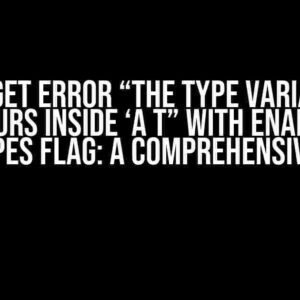As a Java developer, you’ve likely encountered situations where you need to use a list as a key in a HashMap. But have you ever wondered if you can use Java’s List.of() method as a key in a HashMap? In this article, we’ll delve into the possibilities and explore the what, why, and how of using List.of() as a key in HashMap.
What is List.of()?
Before we dive into using List.of() as a key in HashMap, let’s take a quick look at what List.of() is. List.of() is a method introduced in Java 9, which creates an immutable list from a variable number of arguments. It’s a convenient way to create a list without the need to explicitly create a new ArrayList instance and add elements to it.
List<String> list = List.of("apple", "banana", "orange");
Why Would I Want to Use List.of() as a Key in HashMap?
There are several scenarios where using a list as a key in a HashMap makes sense. For instance, you might want to store a set of related data, such as a list of permissions or a list of attributes, and use that list as a key to retrieve or store related data in a HashMap.
Using List.of() as a key in HashMap can provide a concise and expressive way to define the key, especially when the list is small and fixed. However, as we’ll see later, there are some important considerations to keep in mind.
The Problem with Using List.of() as a Key in HashMap
So, can you use List.of() as a key in HashMap? The short answer is yes, but with some caveats.
The main issue with using List.of() as a key in HashMap is that the List.of() method creates an immutable list, which means that the list cannot be modified once it’s created. However, the equals() and hashCode() methods of the list are implemented in such a way that they consider the order of elements in the list.
List<String> list1 = List.of("apple", "banana", "orange");
List<String> list2 = List.of("apple", "banana", "orange");
System.out.println(list1.equals(list2)); // true
System.out.println(list1.hashCode() == list2.hashCode()); // true
This means that if you use List.of() as a key in HashMap, the HashMap will use the hashCode() and equals() methods of the list to determine whether two keys are equal. This can lead to unexpected behavior, as we’ll see in the next section.
The Consequences of Using List.of() as a Key in HashMap
Let’s take a look at an example that demonstrates the potential consequences of using List.of() as a key in HashMap:
Map<List<String>, String> map = new HashMap<>();
List<String> key1 = List.of("apple", "banana", "orange");
List<String> key2 = List.of("apple", "banana", "orange");
map.put(key1, "value1");
map.put(key2, "value2");
System.out.println(map.size()); // 1
System.out.println(map.get(key1)); // value2
System.out.println(map.get(key2)); // value2
As you can see, the HashMap contains only one entry, even though we added two different keys. This is because theAndHashCode() and equals() methods of the list consider the order of elements, and since the lists are equal, the HashMap treats them as the same key.
Alternatives to Using List.of() as a Key in HashMap
So, what alternatives do you have if you need to use a list as a key in a HashMap? Here are a few options:
-
Use a custom key class
You can create a custom key class that wraps the list and provides a suitable implementation of the hashCode() and equals() methods.
public class ListKey { private final List<String> list; public ListKey(List<String> list) { this.list = list; } @Override public int hashCode() { return list.hashCode(); } @Override public boolean equals(Object obj) { if (this == obj) { return true; } if (obj == null || getClass() != obj.getClass()) { return false; } ListKey other = (ListKey) obj; return list.equals(other.list); } } -
Use a Guava’s ImmutableSet
If you’re using Guava, you can use an ImmutableSet as a key in the HashMap. ImmutableSet provides a suitable implementation of the hashCode() and equals() methods.
Map<ImmutableSet<String>, String> map = new HashMap<>(); ImmutableSet<String> key1 = ImmutableSet.copyOf(List.of("apple", "banana", "orange")); ImmutableSet<String> key2 = ImmutableSet.copyOf(List.of("apple", "banana", "orange")); map.put(key1, "value1"); map.put(key2, "value2"); -
Use a different data structure
If the order of elements in the list is not important, you might consider using a different data structure, such as a Set, as a key in the HashMap.
Map<Set<String>, String> map = new HashMap<>(); Set<String> key1 = new HashSet<>(List.of("apple", "banana", "orange")); Set<String> key2 = new HashSet<>(List.of("apple", "banana", "orange")); map.put(key1, "value1"); map.put(key2, "value2");
Best Practices for Using Lists as Keys in HashMap
Here are some best practices to keep in mind when using lists as keys in HashMap:
-
Use immutable lists: To avoid unexpected behavior, use immutable lists as keys in HashMap.
-
Implement custom hashCode() and equals() methods: If you need to use a mutable list as a key, make sure to implement custom hashCode() and equals() methods that take into account the contents of the list.
-
Avoid using List.of() as a key: Due to the issues discussed earlier, it’s generally not recommended to use List.of() as a key in HashMap.
-
Consider using alternative data structures: Depending on your use case, you might find that a different data structure, such as a Set or an array, is more suitable as a key in HashMap.
Conclusion
In conclusion, while it is technically possible to use List.of() as a key in HashMap, it’s generally not recommended due to the issues discussed in this article. Instead, consider using alternative approaches, such as custom key classes, Guava’s ImmutableSet, or different data structures, to achieve your goals.
By following the best practices outlined in this article, you can ensure that your code is robust, efficient, and easy to maintain.
| Approach | Pros | Cons |
|---|---|---|
| Using List.of() as a key | Concise and expressive | Immutable lists, order of elements is important |
| Custom key class | Flexible, customizable | Requires implementation of hashCode() and equals() methods |
| Guava’s ImmutableSet | Efficient, suitable for large datasets | Requires Guava library |
| Different data structure (e.g., Set) | Suitable for certain use cases | May not be suitable for all use cases |
Now that you’ve learned about the possibilities and limitations of using List.of() as a key in HashMap, you’re ready to tackle your next Java project with confidence!
Here is the HTML code with 5 Questions and Answers about “Java List.of() as key in HashMap”:
Frequently Asked Question
Get all your doubts cleared about using Java List.of() as a key in HashMap!
Can I use Java List.of() as a key in HashMap?
No, you cannot use Java List.of() as a key in HashMap. According to the Java documentation, the List interface does not override the hashCode() and equals() methods, which are required for an object to be used as a key in a HashMap.
Why does Java List.of() not override hashCode() and equals() methods?
Java List.of() is an immutable list, and according to the Java specification, immutable objects should have a well-defined hashCode() and equals() method. However, the List interface does not provide a default implementation for these methods, which is why List.of() does not override them.
What happens if I try to use Java List.of() as a key in HashMap?
If you try to use Java List.of() as a key in HashMap, your program will compile without errors, but it will throw a runtime exception when you try to put the key in the map or retrieve a value from the map using the key. This is because the HashMap will not be able to find the key due to the incorrect hash code and equality checks.
Is there an alternative to using Java List.of() as a key in HashMap?
Yes, you can use a custom class that implements the hashCode() and equals() methods correctly, or you can use a different data structure such as a TreeMap, which uses a natural ordering or a custom comparator to store keys.
What is the best practice for using keys in HashMap?
The best practice for using keys in HashMap is to use immutable objects that correctly implement the hashCode() and equals() methods. This ensures that the HashMap can correctly store and retrieve values using the keys.





